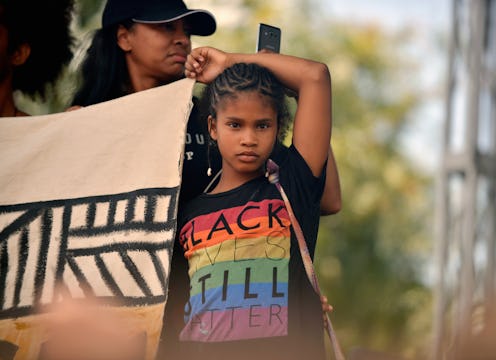
You've likely heard of Equal Pay Day, but you might not know that women of color have to work even longer than white women for the same pay — and that's exactly what Black Women's Equal Pay Day is setting out to tell the world. In order to achieve equal pay for black women in every state, if the current trends continue, it will take until 2124 to close the wage gap for black women, according to City Lab. While all women earn less than white men, black women earn an average of only 67 cents for every dollar a white man earns, which means that in some states black women make far less than that. Additionally, it means that any woman born today will not see equal pay in her lifetime.
Jul. 31 is Black Women's Equal Pay Day, the day in the year that black women have to work until to receive the same pay as a white man — four months longer than white women have to work for the same pay. To put that into perspective, a tweet from Byte Back reads, "The average American man could go on vacation from January until July and still earn the same as the average black woman who works all year."
Essence reported that, "If the wage gap were eliminated, on average, a black woman would earn enough money for nearly 2.5 more years of child care, three years of more food for her family and almost two dozen more months of rent."
Progress Has Slowed, & Even Started To Move Backward
With black women now being the most educated group of people in America, according to Upworthy, the argument that black women could earn more if they had more education is an alternative fact.
While some states are better than others, there are zero states in the U.S. where women and white men receive the same pay for doing the same job with the level of experience and education. So, obviously there are zero states where black women receive equal pay. The National Women's Law Center put together statistics for the wage gap between black women and white men in every state where data was available, and in some states black women are earning more than 50 percent less than white men.
It's impossible to look at these statistics and deny that wage discrimination based on gender and race is not a systematic way to continue to disempower women, and especially women of color. What's even worse is that we're actually going backward.
"Despite the large gender disadvantage faced by all women, black women were near parity with white women in 1979. However in 2016, white women’s wages grew to 76 percent of white men’s, compared to 67 percent for black women relative to white men — a racial difference of 9 percentage points," Valerie Wilson, Janelle Jones, Kayla Blado, and Elise Gould reported for the Economic Policy Institute. "The trend is going the wrong way — progress is slowing for black women."
Here's How Much Longer Black Women Have To Work To Catch Up To White Men
Have you ever met someone who is 104 and still working? For black women in Louisiana, that's the age they would need to work until to make the same amount of money as a white man makes in the same state by age 60 — that's 44 years longer, and that's not acceptable. Idaho is the only state where a black woman can stop working in her 60s (age 65) to earn the same amount as a white man earns by age 60.
While Hawaii, Missouri, Oregon, Delaware, Pennsylvania, Arizona, and Maryland show statistics that would let black women catch up in their 70s, in the majority of other states black women would have to work well into their 80s, 90s, and even past 100 years old, according to data from the National Women's Law Center. You can view this chart from the NWLC to see the results from your state.
Additional data from the Institute for Women's Policy Research noted that Florida could be the first state to close the wage gap in just 21 years (29 years for black women) and Wyoming the last state in 136 years (190 years for black women). Additionally, the IWPR's report, "The Status of Black Women In The United States," noted: "Black women make substantial contributions to the U.S. economy, yet face striking disparities in the labor market. Too often, black women experience discrimination in the workplace, preventing them from advancing in their careers."
The EPI reported that despite the explanations that the wage gap is a myth, the data tells a different story. "Regardless of their connection to the labor market, their level of educational attainment, or their occupation, they are paid less than their white male counterparts. The ongoing gender and racial discrimination faced by black women means that seven months into 2017, black women finally have equal pay with what white men earned last year."
This is unacceptable. Period.